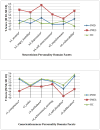Personality traits in psychogenic nonepileptic seizures (PNES) and psychogenic movement disorder (PMD): Neuroticism and perfectionism
- PMID: 28606495
- PMCID: PMC5572831
- DOI: 10.1016/j.jpsychores.2017.03.018
Personality traits in psychogenic nonepileptic seizures (PNES) and psychogenic movement disorder (PMD): Neuroticism and perfectionism
Abstract
Objective: Psychogenic movement disorder (PMD) and psychogenic nonepileptic seizures (PNES) are two subtypes of conversion disorder (CD). In this case-control study, we asked whether these subtypes varied as a function of personality and history of childhood abuse.
Methods: Fifty-nine patients with PMD from the Human Motor Control Section Clinic at the National Institutes of Health, 43 patients with PNES from the Rhode Island Hospital Neuropsychiatry and Behavioral Neurology Division, and 26 healthy volunteers (HC) received a battery of neurological, psychiatric and psychological assessments, including the NEO Personality Inventory Revised (NEO PI-R), the Childhood Trauma Questionnaire (CTQ), and the Traumatic Life Events Questionnaire (TLEQ).
Results: One-way ANOVA between the three groups indicated significant differences in overall domains of Neuroticism (p=0.001) and Conscientiousness (p=0.009): Patients with PNES reported significantly greater levels of Neuroticism (p=0.002) and lower levels of Conscientiousness (p=0.023) than patients with PMD. Levels of Neuroticism remained significantly higher in both PMD and PNES than HC following correction for multiple comparisons. Patients with PNES reported greater levels of depressive and anxiety symptoms, overall psychopathology, greater history of sexual abuse, greater levels of alexithymia, higher levels of dissociative symptoms, and an earlier age at which they experienced their most distressing traumatic event than patients with PMD.
Conclusions: These findings suggest that personality traits, type of abuse and age of onset of trauma varies as a function of CD subtype. Patients with PNES rated greater Neuroticism and lower Conscientiousness than patients with PMD. These differing psychological profiles may inform differing treatment approaches such as psychological therapies for PNES and physiotherapy (with/without psychotherapy) for PMD.
Keywords: Conversion disorder; Functional disorders; Nonepileptic seizures; Personality; Psychogenic movement disorder.
Copyright © 2017 Elsevier Inc. All rights reserved.
Figures
References
-
- American Psychiatric Association., American Psychiatric Association. Task Force on DSM-IV. Diagnostic and statistical manual of mental disorders: DSM-IV-TR. 4. Washington, DC: American Psychiatric Association; 2000.
-
- Reuber M. The etiology of psychogenic non-epileptic seizures: toward a biopsychosocial model. Neurol Clin. 2009;27(4):909–24. - PubMed
-
- Ganos C, Aguirregomozcorta M, Batla A, Stamelou M, Schwingenschuh P, Munchau A, et al. Psychogenic paroxysmal movement disorders--clinical features and diagnostic clues. Parkinsonism Relat Disord. 2014;20(1):41–6. - PubMed
-
- Hopp JL, Anderson KE, Krumholz A, Gruber-Baldini AL, Shulman LM. Psychogenic seizures and psychogenic movement disorders: are they the same patients? Epilepsy Behav. 2012;25(4):666–9. - PubMed
MeSH terms
Grants and funding
LinkOut - more resources
Full Text Sources
Other Literature Sources
Medical
Research Materials
Miscellaneous


